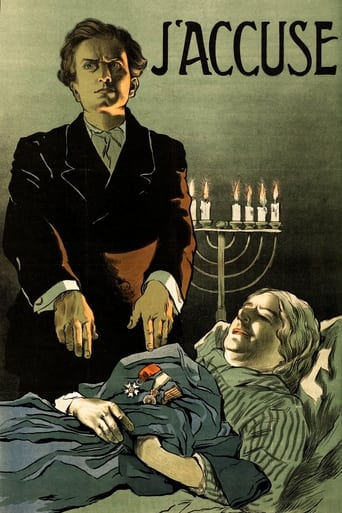chaos-rampant
Here's why I deem this the most important film of the first 20 years; DW Griffith also had a lofty message to impart in Intolerance, but his Victorian saga of humanism through the ages was removed from life, unfolding in the shadow of gigantic Hollywood sets for Babylon or in Judea at the time of Christ. It was comfortably nudged in its archaic pulpit. This is important to understand, by contrast. J'Accuse is not a historical epic on WWI. Gance was drafted in the French Army's Section Cinématographique, was discharged for ill-health, but appalled at the horror of the experience, decided to re-enlist and make a film about it. He filmed actual war booming away through the country, actual soldiers on leave from the front and expected back within days.Oh, the bulk of the film away from the trenches is old-fashioned melodrama, likely to leave the modern viewer cold. What does hold power, is that it is about war inspiring Gance to make the film denouncing war. See, our protagonist is an artist. Like Gance, he is a poet committed to pacifism and blessed with the gift of granting vision, look at the poem he recites to his elderly mother, rendered in silent images, the sun rising over heaving seas. This is a great moment, later repeated for contrast in the midst of muddy war.So, the poet enlists in the army to save a girl he loves but is not his, not solely his at any rate, and is really the whole of France. This all preamble of course - a man who grants visions brought to where visions are possible, the mad theater of war. The most celebrated moment in the film is an actual vision, a poem he recites for an audience back home which has gathered to listen about life in the trenches. It is the rousing sight of the dead rising from the battlefield.Gance used for the scene 2000 soldiers who had come straight from Verdun and were due back eight days later. You have to appreciate the chilling significance of this. Gance was staging death for these people, and death that both parties could not have failed to know was a rehearsal for the real thing. Within weeks of their return, the majority of the soldiers were dead as presaged in the film.So death staged for an audience gathered round back home, at the behest of this poet - now raving mad - who conjures a vision of cinematic phantoms, the dead gaunt and in clutches and tatters getting up from shallow graves to march all the way back and haunt the living. They Accuse! ungrateful parents, wives, brothers, who have not honored the sacrifice.The maelstrom of self-reflexive notions was one of the most advanced things going on at the time, I was surprised really. Gance would go on to invent a new visual grammar with La Roue, and first inklings of that we see here in the rapid-fire cutting and agile camera in the battle scenes that reflect the anxious mobility tearing through Europe, that was really the fight for a modern world.
FerdinandVonGalitzien
In connection with the showing at this German Count's private cinema of the film "Mater Dolorosa" (1917) by Herr Gance some months ago, this Teutonic aristocrat had praised and even eulogized the good film work of this important and essential French film director. "Mater Dolorosa", with its superb cinematographic technique, was a great definitive leap forward in Herr Gance's career."J'Accuse!" confirms aristocratic suspicions about Herr Gance's ability. Because it's without any doubt another great film in which those pioneer cinematographic techniques mentioned before are carried out. Again an excellent example of technical experimentation to achieve a film narrative, J'Accuse is superbly developed… achieving an unquestionable masterpiece."J'Accuse!", besides it's perfect technique, is an emotive antiwar message filmed during the I World War great disaster and with wounds still open. It's a film that denounces the absurdity of war, its uselessness and the terrible consequences that society suffers. It demands the viewer to take note of the great sacrifices and injustices of many broken lives that never will be the same through the fault of the war.And now, if you'll allow me, I must temporarily take my leave because this German Count when mentioning those old wars plenty of lost battles, is slightly Teutonic.
Nazi_Fighter_David
The only attempt to make a peace film during the war was in France, by the great Abel Gance... 'J'accuse' is almost as large in scope as 'Intolerance'. The director said that: 'It was intended to show that if war did not serve some purpose, then it was a terrible waste. If it had to be waged, then a man's death must achieve something.' "J'accuse" is a triangle story of Edith (Marise Dauvray), her husband François Laurin (Severin-Mars) and Jean Diaz (Romould Joube), a poet who is in love with Edith... The three, however, are puppets in the hands of war...Edith is taken captive and returns with a child... François and Jean... Well you have to see the film! All this now seems excessively melodramatic and not entirely impartial, but visually "J'accuse" is an extremely powerful film and it certainly had an impact on contemporary audiences...The film was remade by Abel Gance in 1937 in an attempt to warn against the impending World War II...
Enrique Sanchez
It's hard to describe the images you will see in this film. They cut to the very core of the most horrific results of war. It is a fantasy which will leave you with images that will not leave you.Any mention of the particulars here might spoil the experience of this great silent offering.


